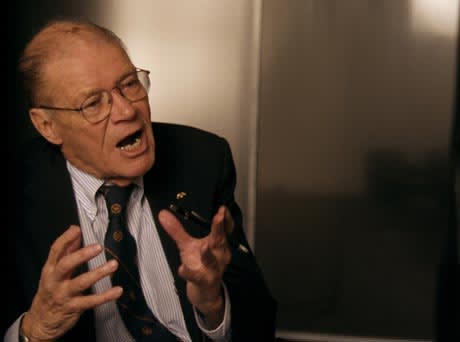Knowing that The Fog of War is a chronicle of the wartime activities of Robert S. McNamara, I expected it to be harsher. After all, McNamara was the Secretary of Defence under John F. Kennedy and Lyndon Johnson, and was the primary architect behind American military operations in Vietnam. He also worked for the Defence Department during WWII and it was his recommendation that the U.S. attack Japan with fire bombs, resulting in over 100,000 casualties in Tokyo in a single night, demolishing the wooden city. McNamara acknowledges the mistakes that he made, but that knowledge comes only with the benefit of hindsight. Now 85 years old, McNamara is at once extremely open and forthcoming (about the Second World War) and remains cagey and evasive, at times, about Vietnam. Watching this process his explanations and justifications merged with taped conversations with powerful men at the time makes The Fog of War an incredibly compelling documentary that doesn't succumb readily to easy answers. As a documentarian, Errol Morris excels at getting his subjects to talk directly, giving them enough rope to completely entangle, if not hang, themselves. Throughout his most powerful work The Thin Blue Line, Gates of Heaven, Fast Cheap and Out of Control he lets the subjects be themselves long enough to almost forget that the camera is there. This one is different. It's not that McNamara is too smart for such ploys, but he seems to seek the answers and peace as much as Morris does from behind the scenes. In fact, more than any previous documentary, Morris is drawn into the dialogue and debate with McNamara, as if trying to piece together exactly how his various messes got created. The result is fascinating. McNamara is still haunted by the ghost of JFK. Since he later clashed vehemently with Johnson over the direction of the war, he's convinced that without Jack Kennedy's assassination, America would have been almost completely out of Vietnam by 1965, not all in. It's just the type of "what if?" that McNamara actually enjoys contemplating he's not a historian, he has no commitment to the truth, he can only look back on the arc of his life and wonder what might have been had certain signpost events not occurred. By the end of The Fog of War (as happens with most all of Morris's excellent docs), McNamara has our sympathy. His perspectives on modern war and the responsibility of the world's most powerful nations are compelling; and his recommendations and perspectives on corporate life are insightful (he was the president of Ford before Vietnam and of the World Bank after). And while he fully acknowledges his mistakes, he doesn't beat himself up over them he is at peace about his efforts, his intentions and the limitations of human beings. On the DVD reissue, McNamara's human side gets more fleshed out in 24 different deleted sequences, which range from mere snippets and expanded scenes to full-blown stories, poetry appreciation and anecdotes. It helps create a fuller picture of the man behind some of the 20th century's most impactful decisions, and the fact that he's just a man. Plus: McNamara's ten lessons from his life in politics, trailers, more. (Columbia/Tristar)
The Fog of War
Errol Morris

BY James KeastPublished Jan 1, 2006